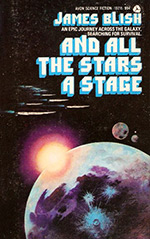
![]() BigEnk
BigEnk
2/19/2025
![]()
A fix-up of previously published stories from the sixties, published together in 1970 with some additional material added. A confused and scattered narrative follows Jorn, a man who belongs to a matriarchal society stumbling into a role in space experimentation following advances in technology and theory following the observation of a nearby supernova. These experiments in long distance space travel prove fortuitous, as the sun shows the signs of going supernova itself in a short numbers of years. Following a section of action as a fleet of generation ships launch into space, the rest of the novel essentially functions as a series of vignettes, where Jorn's ship finds and explores a series of planets for colonization.
Blish is in full exposition mode in And All The Stars A Stage. I'm convinced that when Blish was writing these serials in 1960 that he was paid by the word, because there are so many long-winded, unnecessary, and repetitive explanations. A side effect of this writing is that the characters are so transparent and wispy that they might as well not even exist. Blish is much more concerned with telling you why certain decisions are made mathematically than expanding on either the worlds that the humans encounter, the familiars that the humans have, or making the narrative not so scattershot.
Another main point of contention I have is Blish's conservative exploration of gender politics. After the generation ships reach space, it's found that men just do better (somehow) at all manner of technical work, which moves them back into a position of power, with even the most strident women happily taking a submissive role. Genetic disposition aside, it's crazy that Blish thought that women would just lay the fuck down like that. Really speaks to his conservative, chauvinistic, incel side. It's also just a bland way to wrap up that thread.
I will say that Blish, especially when compared to his peers in genre fiction, could write an ending. This ending is not nearly as good as A Case of Conscience, but does recontextualize the rest of the novel is a satisfying way. I also enjoyed the bits of exposition on how to keep a work force happy that starts to realize it's own impending mortality, and the social dynamics on a generation ship as the culture changes.
This is a minor work from an author that is capable of doing so much better.